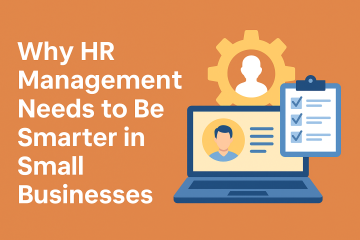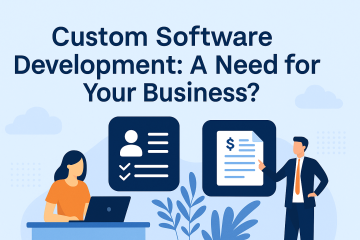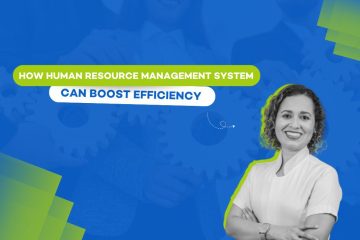Introduction for Human Resource Management System
Human Resource Management (HRM) is one of the core functions of any organization. It encompasses everything from recruitment and onboarding to payroll, benefits management, employee engagement, and compliance. As businesses grow, managing these tasks manually becomes inefficient and time-consuming. This is where a Human Resource Management System (HRMS) comes into play.
An HRMS is software that automates various HR tasks, improving efficiency and accuracy. However, with so many options available, choosing the right HRMS for your business can be overwhelming. In this blog, we’ll discuss the top features you should look for when selecting the best HRMS for your company, helping you streamline operations and improve overall productivity.
1. Employee Data Management
The foundation of any HRMS is its ability to manage employee data effectively. A robust HRMS should centralize all employee information, including personal details, employment history, tax information, performance evaluations, and benefits.
Why It’s Important:
This feature allows HR professionals to access and update employee data quickly and accurately, reducing errors and ensuring compliance with legal requirements. In addition, a centralized database improves collaboration across departments, enabling different teams to work together more efficiently.
For example, if an employee is promoted, their new title and responsibilities can be updated in the system and immediately reflected in payroll and performance tracking modules.
2. Payroll Processing and Benefits Administration
One of the key challenges for HR teams is managing payroll and employee benefits. The right HRMS should automate payroll processing, including tax calculations, salary disbursement, and benefits management.
Why It’s Important:
Automating payroll reduces the risk of errors, saves time, and ensures employees are paid on time. A reliable payroll system also helps businesses stay compliant with local labor laws, including tax regulations. In Delhi, for example, companies must comply with the Provident Fund (PF), Employee State Insurance (ESI), and tax deduction regulations, making a payroll processing feature critical for businesses.
Additionally, the benefits administration feature allows HR teams to track and manage health benefits, retirement plans, and other perks. Employees can also access self-service portals to view their payslips and benefits, reducing the burden on HR.
3. Recruitment and Applicant Tracking
Effective recruitment is vital to a company’s growth, and an HRMS with an integrated Applicant Tracking System (ATS) can streamline the hiring process. From posting job openings to managing applications and scheduling interviews, an ATS helps HR professionals manage the recruitment cycle more efficiently.
Why It’s Important:
A well-designed ATS allows HR teams to track applicants, communicate with candidates, and even collaborate with hiring managers—all in one place. This speeds up the hiring process, reduces the time-to-hire, and improves the candidate experience.
For IT companies in Delhi, where there is a high demand for skilled professionals, an ATS helps identify and attract the right talent quickly. The system can also filter applicants based on qualifications, reducing the amount of time spent manually reviewing resumes.
4. Performance Management and Appraisals
Performance management is an integral part of employee development and retention. A strong HRMS should include performance management tools that allow managers to set goals, monitor employee progress, and provide feedback in real-time.
Why It’s Important:
With performance management features, HR teams can track employee performance over time, conduct appraisals, and identify areas for improvement. The system allows for 360-degree feedback, peer reviews, and self-assessments, providing a comprehensive view of employee contributions.
For businesses looking to retain top talent, this feature helps in recognizing achievements and planning career development paths. It also makes it easier to manage promotions, salary adjustments, and performance-based incentives.
5. Learning and Development
Employee training and professional development are crucial for fostering growth and maintaining a competitive edge. A robust HRMS should include a Learning Management System (LMS) that helps HR teams organize training programs, track progress, and assess outcomes.
Why It’s Important:
An LMS feature allows businesses to create and deliver training programs tailored to individual employee needs. This can include onboarding new hires, upskilling existing employees, or preparing staff for leadership roles.
Companies in the tech industry, such as those in Delhi, benefit significantly from continuous learning programs. An integrated LMS helps keep employees updated on the latest trends, technologies, and best practices, enhancing productivity and fostering innovation.
6. Employee Self-Service Portal
One of the most sought-after features in an HRMS is an employee self-service portal. This feature allows employees to access their own information, submit leave requests, update personal details, and view payslips—all without HR intervention.
Why It’s Important:
A self-service portal reduces the administrative burden on HR professionals, freeing up time for more strategic tasks. It also empowers employees by giving them control over their personal information and reducing wait times for routine requests.
Additionally, the transparency of having instant access to personal data and performance reviews improves employee engagement and satisfaction.
7. Compliance and Reporting
HR departments must stay compliant with various local, state, and national regulations, especially in countries with complex labor laws like India. The best HRMS solutions provide built-in compliance features and automated updates to ensure that the company adheres to all relevant laws.
Why It’s Important:
Non-compliance can lead to hefty fines and legal issues. HRMS systems simplify compliance by automating the generation of required reports, such as tax filings, employee records, and leave policies. They can also provide alerts for upcoming regulatory changes, helping businesses stay ahead of legal requirements.
In a city like Delhi, with a dense workforce and numerous regulations, staying compliant is vital for businesses to avoid legal complications and financial penalties.
8. Mobile Accessibility
In today’s world, mobility is key. Many HRMS solutions offer mobile apps or web-based platforms that allow HR professionals and employees to access the system on-the-go.
Why It’s Important:
Mobile accessibility ensures that employees and managers can stay connected with HR processes even when they’re not in the office. From approving leave requests to viewing payslips, having access to HR information on mobile devices enhances flexibility and responsiveness.
For fast-paced industries like IT, where teams often work remotely or across different locations, mobile HRMS access ensures smooth operations and reduces delays in administrative tasks.
9. Customization and Scalability
Every company is unique, and an HRMS should offer customization options that align with specific business needs. Whether it’s adjusting workflows, creating custom reports, or integrating with other business systems, a flexible HRMS can grow with your company.
Why It’s Important:
As companies expand, their HR needs become more complex. An HRMS that is scalable and customizable can adapt to these changes, ensuring that the system remains relevant and efficient as the company grows.
For IT companies in Delhi, which often experience rapid growth, scalability ensures that the HRMS continues to serve the business without needing constant upgrades or replacements.
Conclusion
Choosing the right Human Resource Management System (HRMS) is essential for streamlining HR processes, improving efficiency, and enhancing employee satisfaction. From employee data management and payroll automation to performance tracking and compliance reporting, the best HRMS offers a comprehensive suite of features that simplify daily tasks for HR professionals and managers alike.
For companies looking to stay competitive, investing in a robust HRMS is not just a smart move—it’s a necessity. Partnering with a reliable software company in Delhi ensures that the system is customized to meet the specific needs of your business and helps you stay compliant with local regulations.



0 Comments